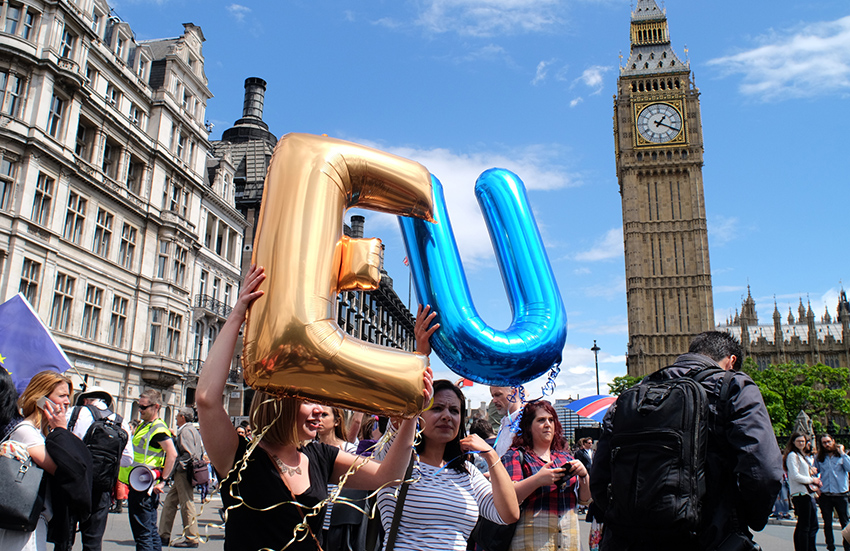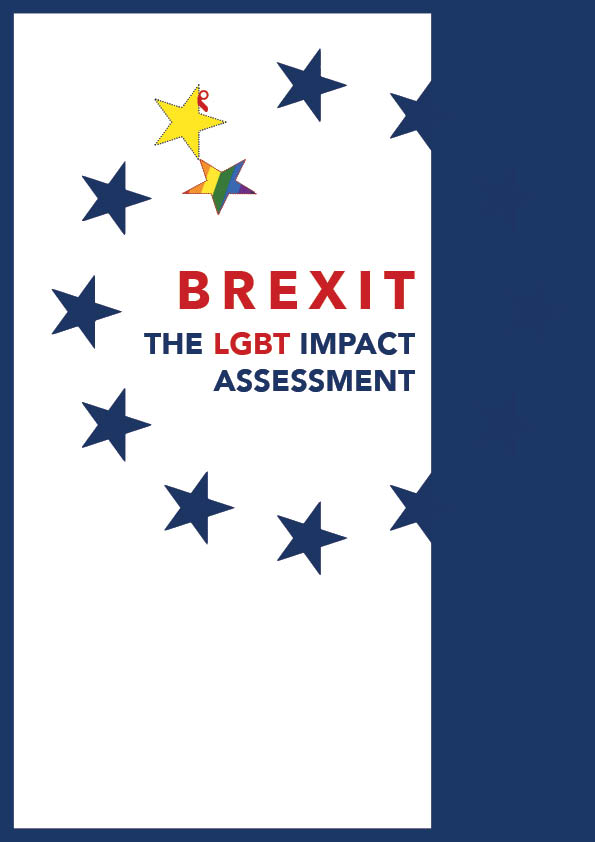Brexit continues to spark protests in the UK. | Photo: Gustavo Ferlizi.
Brexit will leave UK LGBT people dangerously unprotected if a future government is homophobic or transphobic, our new report reveals today.
Gay Star News commissioned leading lawyers in LGBTI human rights to write Brexit: The LGBT Impact Assessment.
They conclude that the European Union helped deliver many of the rights and protections that gay, bi and trans people in the UK enjoy today.
And they say that leaving the EU will leave British LGBT people vulnerable if a future government is less supportive. Currently the EU locks the UK into protecting people on the basis of sexuality and gender identity. And it provides gay, bi and trans people with a legal route to appeal if the UK doesn’t treat them fairly.
The report also shows the EU has helped drive UK LGBTI rights forward, particularly in the last two decades. It asks how the government could do that alone, and whether progress will slow once we leave the EU?
What has Europe ever done for us?
The reports authors also point out key rights and protections that British LGBT people currently enjoy thanks to Europe.
Free movement: This guarantees LGBT people who move to another EU member state for work can travel with their spouse or civil partner – particularly if the latter is not a European Union citizen. It is particularly important for LGBT families, and the EU seems poised to grant even greater rights, just as the UK leaves.
Transgender rights: EU law protects trans people from a government which may want to chip away at their rights. It’s thanks to Europe that employers in the UK can’t fire trans people because of their gender identity. It also provides protections around equal pay and pensions.
Lesbian, gay and bi employment rights: Membership of the EU gives lesbian, gay and bi workers employment rights. Bosses can’t fire them or treat them unfairly due to their sexual orientation.
In the report, co-author Peter Dunne, a lecturer in law at the University of Bristol, says:
‘There is a genuine risk that – if Britain descends into a race-to-the-bottom ‘business competitiveness’ culture – LGB employment guarantees will be subtly, but significantly, curtailed.’
Relationship recognition: The EU doesn’t insist on member states granting same-sex marriage. But EU members were hugely influential on England, Wales and Scotland when they passed marriage equality. And the report shows the EU has helped make sure that equal marriage in Britain really is equal.
Asylum: The European Court of Justice, which Britain will leave as part of Brexit, has helped LGBTI asylum seekers. Its rules ban intrusive, unfair tests. For example, it stops Home Office officials for asking gay and bi asylum seekers for sex tapes to prove their sexuality.
Government using Brexit to scrap the world’s highest LGBT rights protection
Could LGBTI rights go backwards after Brexit? The government promises they won’t. But there is no guarantee.
The report argues that Section 28 – the censorship law that blighted the lives of a generation of young LGBTI people – couldn’t happen under the modern EU rules. But without EU membership, the UK has nothing to stop LGBTI-hating politicians from passing a similar law in future.
In particular, the report recommends the UK retains the EU Charter of Fundamental Rights. This effectively guarantees many of the rights we enjoy today, politicians can’t just take them away. But the government says we don’t need the Charter in UK law post Brexit.
One of the reports authors, Jonathan Cooper, is a leading human rights barrister. He was involved in some of the key European court cases that led to improved LGBT rights in the UK.
In the report, he argues that the loss of the EU Charter of Fundamental Rights is a mistake:
‘We are also removing from the UK’s jurisdiction the only international binding legal instrument that expressly prohibits discrimination on the grounds of sexual orientation in the text of the document.
‘That is counter-intuitive. Were those who voted to leave the EU voting to take away LGBT rights without replacing those rights with something equal or better? It is unlikely that was their intent.’
Lord Cashman was a co-founder of Stonewall and championed LGBTI rights in the European Parliament as Michael Cashman MEP. In his Foreword to our report, he says:
‘The Charter of Fundamental Rights is a stunning reaffirmation that rights will be protected against governments who would not otherwise give them, or wish to take them away. It is a Charter that has helped to progress human rights in other parts of the world too. It remains a powerful tool.’
What can we do about it?
The polls tell us that Brexit bores many Brits. But a straw poll just before the referendum showed 77% of GSN readers wanted to remain in the EU. And more recent polling has showed the public would likely support a second referendum once the details of Brexit are known.
Our report makes recommendations for the UK Government and Parliament, businesses and organisations, and individuals.
Among nine recommendations to the UK Government, it says it should:
- Reconsider retaining membership of the Single Market, which contains significant benefits for LGBTI and other citizens, and without which it will be easier for LGBTI rights to be undermined in future.
- Retain the EU Charter of Fundamental Rights.
- Undertake to hold a second referendum on the terms of the Brexit deal, including the option to remain in the EU, to allow LGBTI citizens and others to make an informed choice once the full facts and final deal are known.
And it says businesses, organisations and individuals should continue to argue for the future they want to see. They do not have to passively accept what the Brexiteers are prepared to offer.
Get your copy of Brexit: The LGBT Impact Assessment
You can download, read and share the whole report here:
Read why GSN commissioned the Brexit report here.








